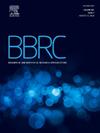Epigallocatechin-3-gallate induces immunogenic cell death and enhances cancer immunotherapy in colorectal cancer
IF 2.5
3区 生物学
Q3 BIOCHEMISTRY & MOLECULAR BIOLOGY
Biochemical and biophysical research communications
Pub Date : 2024-10-25
DOI:10.1016/j.bbrc.2024.150907
引用次数: 0
Abstract
The induction of immunogenic cell death (ICD) can activate antitumor immune response to potentiate cancer immunotherapy. In this study, we observed the antitumor activity following combinatorial therapy with anti-CTLA4 antibody and epigallocatechin-3-gallate (EGCG) in CT26 tumors.Indeed, EGCG triggered colon cancer cells ICD with the secretion of high-mobility group protein B1 (HMGB1) and the surface expression of calreticulin (CRT) and heat shock protein 70 (HSP70). Mice treated with EGCG promoted the maturation of dendritic cells and enhanced the effector function of CD8+ T cells within tumors to remodel the tumor immune microenvironment. Overall, these results indicate that EGCG, a novel ICD inducer, triggers ICD in CRC, and provides a new concept for cancer immunotherapy.
表没食子儿茶素-3-棓酸盐诱导免疫原性细胞死亡并增强结直肠癌的癌症免疫疗法。
诱导免疫原性细胞死亡(ICD)可激活抗肿瘤免疫反应,从而增强癌症免疫疗法的效果。在这项研究中,我们观察了抗CTLA4抗体和表儿茶素-3-没食子酸酯(EGCG)联合治疗CT26肿瘤后的抗肿瘤活性。事实上,EGCG能诱导结肠癌细胞ICD,并分泌高迁移率基团蛋白B1(HMGB1),促进钙调蛋白(CRT)和热休克蛋白70(HSP70)的表面表达。用EGCG治疗的小鼠促进了树突状细胞的成熟,增强了肿瘤内CD8+ T细胞的效应功能,从而重塑了肿瘤免疫微环境。总之,这些结果表明,EGCG是一种新型ICD诱导剂,它能引发CRC的ICD,为癌症免疫疗法提供了一个新概念。
本文章由计算机程序翻译,如有差异,请以英文原文为准。
求助全文
约1分钟内获得全文
求助全文
来源期刊
CiteScore
6.10
自引率
0.00%
发文量
1400
审稿时长
14 days
期刊介绍:
Biochemical and Biophysical Research Communications is the premier international journal devoted to the very rapid dissemination of timely and significant experimental results in diverse fields of biological research. The development of the "Breakthroughs and Views" section brings the minireview format to the journal, and issues often contain collections of special interest manuscripts. BBRC is published weekly (52 issues/year).Research Areas now include: Biochemistry; biophysics; cell biology; developmental biology; immunology
; molecular biology; neurobiology; plant biology and proteomics

 求助内容:
求助内容: 应助结果提醒方式:
应助结果提醒方式:


